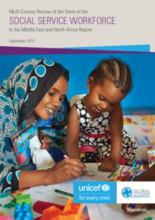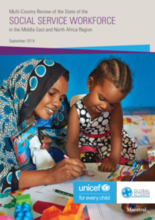The Multi-Country Review of the State of the Social Service Workforce in the Middle East and Africa Region Report shows that gaps in workforce support and funding negatively affect the quality and effectiveness of social services, leading to missed opportunities for protecting children and improving the well-being of the region’s most vulnerable populations. The report is a review of the social service workforce in eight countries: Djibouti, Iran, Jordan, Lebanon, Morocco, Palestine, Sudan and Tunisia.
Highlights from the report include:
- There are many countries within the region that have made great progress in planning, developing and supporting their social service workforce, through establishing policies, codes of ethics, minimum standards, licensing, registration, and training and degree programs. Learnings from these countries can be applied to support countries still in the early stages of workforce development.
- Low ratios of social service workers to child population reduce access to and quality of care. The number of workers per 100,000 children ranges within the eight countries from 19 to 140. The global target ratio is 2000 workers for every 100,000 children.
- Lack of available data on this workforce negatively affects allocations of proper human and financial resources, resulting in decreased quality and availability of services.
- With up to 173 different job titles for social service workers reported, comparing data across countries can be challenging; however, this also highlights progress and importance of cultural and contextual application of titles between English, French and Arabic.
Executive Summary:


